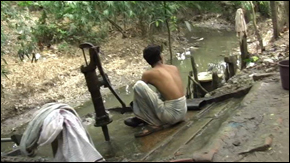UN to Vote on Declaring Water a Human Right
The United Nations General Assembly will begin debating, and possibly vote on, a contentious and historic right-to-water resolution today.

By Brett Walton
Circle of Blue
The United Nations General Assembly will, for the first time, consider a resolution declaring water and sanitation as human rights today.
Although no human rights treaty has ever explicitly stated a right to water, many human rights experts believe it implied as a necessary condition for meeting other rights. Article 25 of the Universal Declaration of Human Rights mentions food, clothing, housing, medical care and necessary social services but not water. In 2002 a U.N. sub-committee on economic, social and cultural rights advanced the water-as-a-right claim by declaring it in an assessment paper.
Bolivia proposed the resolution being considered this week. An advisor to the Bolivian mission told Circle of Blue that the country wrote the first draft of the text, but the final version was a collaborative effort incorporating feedback from its 37 co-sponsors and other U.N. members.
“Bolivia felt like it was time for people to decide on water as a right,” the advisor said. “Bolivia wanted to force the issue.”
A U.N. public information officer said that a vote on Wednesday is possible.
The resolution, which would not be legally binding, declares that: “The right to safe and clean drinking water and sanitation as a human right that is essential for the full enjoyment of the right to life.” It also calls for countries and international organizations to help by providing “financial resources, capacity building and technology transfer.”
But, according to some experts, the resolution has pitfalls. Any attempt to codify a right to water will have to deal with implementation and obligations, said Gabriel Eckstein, a water law professor at Texas Tech University. Aside from maintaining quantity, quality, provision and responsibility, Eckstein said he has concerns about the wording used in this particular document.
“It’s a nice statement that you’d find in a resolution, but what does it mean?” said Eckstein. “The problem I have is the right to life is a negative right as opposed to economic and social rights which are positive rights.”
Positive rights require something to be provided, such as food or shelter; negative rights, like free speech, are things that can be taken from a person.
The initiative has many supporters including Maude Barlow, who chairs the Council of Canadians and Food and Water Watch. Barlow issued this statement:
“It’s time to reach consensus that the world’s poor deserve recognition of this human right without further delay or equivocation. Anything less will affirm that the world’s powerful nations are all wet when it comes to alleviating poverty and addressing the greatest human rights violation of our time. The coming storm sets up a North [against] South divide the body can ill afford.”
Nearly 900 million people are without access to improved water sources while 2.6 billion lack adequate sanitation, mostly in sub-Saharan Africa and Asia.
Several countries—including Canada, China and the United States—have been reluctant to support a right to water because of the uncertainty as to how it would be implemented. Some officials fear that if countries were obligated to provide free or low cost water, it could undermine attempts to effectively allocate and price water.
It is not clear whether declaring a right to water would provide tangible benefit to the people it is supposed to help.
For countries with a constitutional right to water, economist David Zetland looked at access rates before and after the right was enacted and compared them to countries with similar levels of economic development. Though access improved with both groups, he found no statistically significant difference between them.
Even though the merits of the resolution are uncertain and would not be binding Eckstein thinks it would send the right message: “I think it does further the cause of bringing water to people in need… Though there isn’t legal force [in a declaration], there is moral force. It gets countries thinking about how to provide access.”
Brett Walton is a Seattle-based reporter for Circle of Blue. Contact Brett Walton
Read more about water as a human right on Circle of Blue and follow our coverage of the U.N.’s decision
Brett writes about agriculture, energy, infrastructure, and the politics and economics of water in the United States. He also writes the Federal Water Tap, Circle of Blue’s weekly digest of U.S. government water news. He is the winner of two Society of Environmental Journalists reporting awards, one of the top honors in American environmental journalism: first place for explanatory reporting for a series on septic system pollution in the United States(2016) and third place for beat reporting in a small market (2014). He received the Sierra Club’s Distinguished Service Award in 2018. Brett lives in Seattle, where he hikes the mountains and bakes pies. Contact Brett Walton








Leave a Reply
Want to join the discussion?Feel free to contribute!